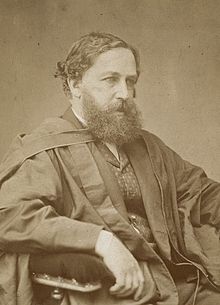William Stanley Jevons
| William Stanley Jevons | |
|---|---|
 |
|
| Born |
1 September 1835 Liverpool, Lancashire, England |
| Died | 13 August 1882 (aged 46) Bexhill-on-Sea, Sussex, England |
| Nationality | British |
| Fields |
Economics Logic |
| Institutions |
University College London 1876–80 Owens College (now University of Manchester) 1863–1875 |
| Alma mater | University College London |
| Academic advisors | Augustus De Morgan |
| Known for | Marginal utility theory |
| Influences | Jeremy Bentham |
| Influenced |
Frank Fetter Irving Fisher Henry Hazlitt Alfred Marshall Karl Popper Lionel Robbins Philip Wicksteed |
| Signature | |
| Notes | |
|
While not a formal advisor (Jevons never acquired a PhD), De Morgan was his most influential professor.
|
|
William Stanley Jevons FRS (/ˈdʒɛvənz/; 1 September 1835 – 13 August 1882) was an English economist and logician.
Irving Fisher described Jevons' book A General Mathematical Theory of Political Economy (1862) as the start of the mathematical method in economics. It made the case that economics as a science concerned with quantities is necessarily mathematical. In so doing, it expounded upon the "final" (marginal) utility theory of value. Jevons' work, along with similar discoveries made by Carl Menger in Vienna (1871) and by Léon Walras in Switzerland (1874), marked the opening of a new period in the history of economic thought. Jevons' contribution to the marginal revolution in economics in the late 19th century established his reputation as a leading political economist and logician of the time.
Jevons broke off his studies of the natural sciences in London in 1854 to work as an assayer in Sydney, where he acquired an interest in political economy. Returning to the UK in 1859, he published General Mathematical Theory of Political Economy in 1862, outlining the marginal utility theory of value, and A Serious Fall in the Value of Gold in 1863. For Jevons, the utility or value to a consumer of an additional unit of a product is inversely related to the number of units of that product he already owns, at least beyond some critical quantity.
It was for The Coal Question (1865), in which he called attention to the gradual exhaustion of the UK's coal supplies, that he received public recognition, in which he put forth what is now known as the Jevons paradox, i.e. that increases in energy production efficiency leads to more not less consumption. The most important of his works on logic and scientific methods is his Principles of Science (1874), as well as The Theory of Political Economy (1871) and The State in Relation to Labour (1882). Among his inventions was the logic piano, a mechanical computer.
...
Wikipedia
